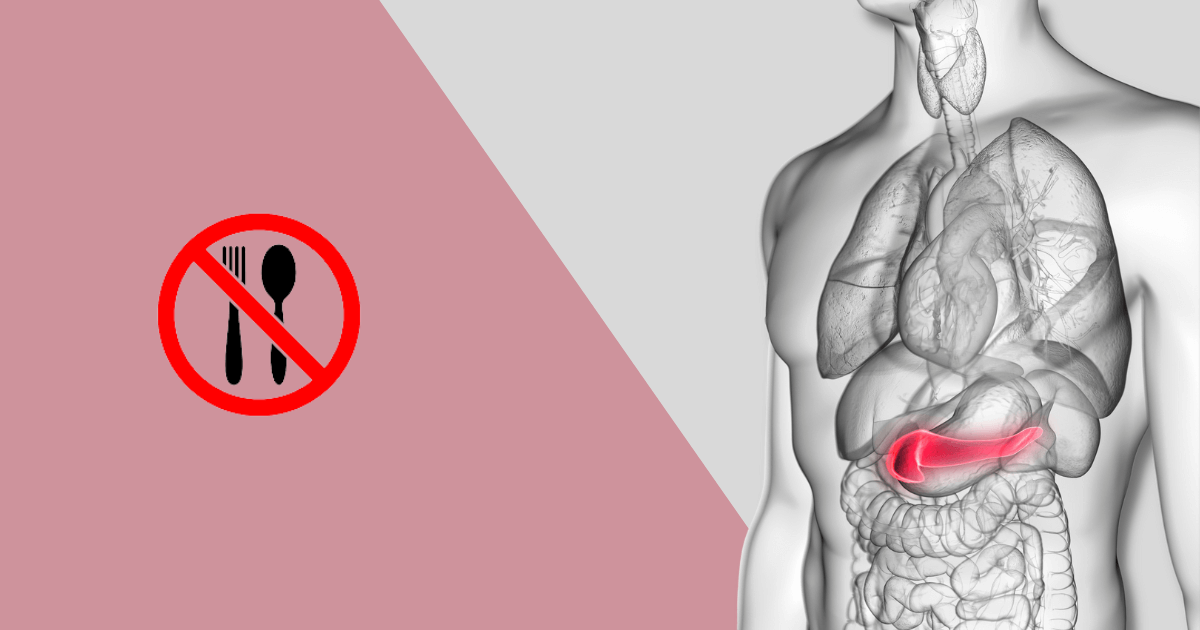What foods to avoid with pancreatitis
Table of contents
Acute pancreatitis is a condition caused by inflammation of the pancreas over a short period of time. Most people will recover from acute pancreatitis within a week and have no further complications, but some people may develop serious complications. Acute pancreatitis is not the same as chronic pancreatitis, where the pancreas is damaged permanently from years of inflammation.
Acute pancreatitis is often associated with gallstones and consuming too much alcohol. By reducing your alcohol intake and making changes to your diet, you can reduce your risk of developing acute pancreatitis. Here we will look at what pancreatitis is, its symptoms, which foods you should avoid, as well as what foods you can eat, and treatments available to improve your quality of life.
Symptoms of acute pancreatitis
The most common symptom of acute pancreatitis is severe pain suddenly developing in the center of your stomach. Other symptoms include:
- Nausea, vomiting
- Indigestion
- Abdominal pain
- Fever
- Yellowing of the whites of your eyes and skin (jaundice)
- Tenderness or swelling of the tummy
- Increased heart rate or breathing
Eating or drinking may make your symptoms worse especially if you eat fatty foods. Acute pancreatitis caused by gallstones normally occurs after eating a large meal. Pain caused by alcohol develops 6 to 12 hours after drinking excessively.
Benefits of a Pancreatitis Diet
A pancreas not working properly may not be able to produce insulin, leading to diabetes. Studies show that high-fat diets are more likely to cause abdominal pain in males and more likely to cause chronic pancreatitis at a younger age.
Reducing fat intake helps the pancreas to repair and prevents further damage. Patients with severe chronic pancreatitis have been seen to benefit from having a low-fat diet.
A pancreatitis diet plan will be based on your individual dietary needs. Fat is a vital part of a balanced diet, and you will need to adjust the type of fat you eat. A fat called medium-chain triglycerides (MCTs) can be digested without you pancreas being involved. Also, you may be prescribed digestive enzymes if you are unable to process certain fats. These enzymes can replace what your pancreas would normally, but can not produce. Examples of pancreatic enzyme therapy includes Pancreaze and Creon.
The most common causes of pancreatitis are due to alcohol abuse or gallstones (crystallized cholesterol stones that form in the gallbladder) that block enzymes needed from leaving the pancreas. A pancreatitis diet can also help you reduce malnutrition. Vitamins A, D, and E are fat-soluble, and problems with fat digestion can make it more difficult to absorb these nutrients,
Foods to avoid
You may need to manage your diet based on if you are having an acute attack or are trying to stop inflammation. If you are having an acute attack, you may need to stick to softer, more bland, low-fat foods until your symptoms stop. To stop future attacks you may need to make changes to your diet, using diet tips provided.
The general principle for any diet plan is to eat a healthy balanced diet. Foods to avoid that trigger attacks and cause flare-ups include:
- Refined carbohydrates – white bread, sugary foods and drinks, cakes, cookies, waffles, granola, cereal, and pastries
- Red meat, organ meat
- Processed meat (sausage, hot dogs, lunchmeat)
- Mayonnaise, margarine, butter, nut butter (peanut, almond), full-fat dairy, whole milk, cheese
- Ice cream, custards, milkshakes, smoothies with dairy
- Alcohol
- Baked goods – donuts, bagels, croissants
- Battered/fried fish and shellfish
- Eggs with yolk
- Fried foods/fast food – stir-fried vegetables, fried rice, fried eggs, french fries, potato chips
- Jams, jellies
- Soda, energy drinks
What foods can I eat?
The best foods you can eat include:
- Vegetables
- Fruits
- Whole grains
- Beans, lentils
- Low-fat or nonfat dairy
- Antioxidant-rich foods – dark, leafy vegetables, blueberries, sweet potatoes, grapes, walnuts, and pomegranates (avocado, olive oil, fatty fish, nuts, and seeds in moderation)
- Dairy-free alternatives (almond, rice)
- Fish (haddock, cod)
- Sugar-free fruit and vegetable juice
- Decaffeinated coffee, or herbal tea
- Lean meats
- Low or non-fat dairy products
- Low-fat sweets – graham crackers, ginger snaps, tea biscuits
- Nutritional supplement drinks
- Poultry without the skin – chicken, turkey
- Low-sugar jams and jellies
- Low-fat or fat-free clear soups and broth
- Spices and fresh herbs – salsa, tomato-based sauces
- Sugar-free gelatin, ice pops
- Tuna in water
Treatment for pancreatitis
If gallstones are causing your pancreatitis, you may require an endoscopic retrograde cholangiopancreatogram to remove the gallstones or the removal of your gallbladder. If alcohol was the cause of your acute pancreatitis you should completely avoid alcohol once you have recovered.
In some cases, medication such as amitriptyline (Elavil), gabapentin, or pregabalin may be used to help relieve the pain. Discuss what the most effective treatment option is for you with your healthcare provider.
Eating small meals and snacks throughout the day instead of larger meals may also help with the symptoms of pancreatitis.
Take multivitamins and supplements to replace any nutrients you cannot get in your food. Speak with a registered dietitian or nutritionist about which supplements are suitable for you. Also, speak to your nutritionist to develop a healthy eating plan and to discuss other lifestyle changes you can make to manage your condition better without putting too much stress on your digestive system.
Medically reviewed
A medical professional has reviewed this article.


Jamie Winn, PharmD
Jamie Winn, PharmD
Dr. Jamie Winn received his Doctor of Pharmacy in 2002 from the University of South Carolina College of Pharmacy, Columbia, SC. Jamie is a medical reviewer for NiceRx.

